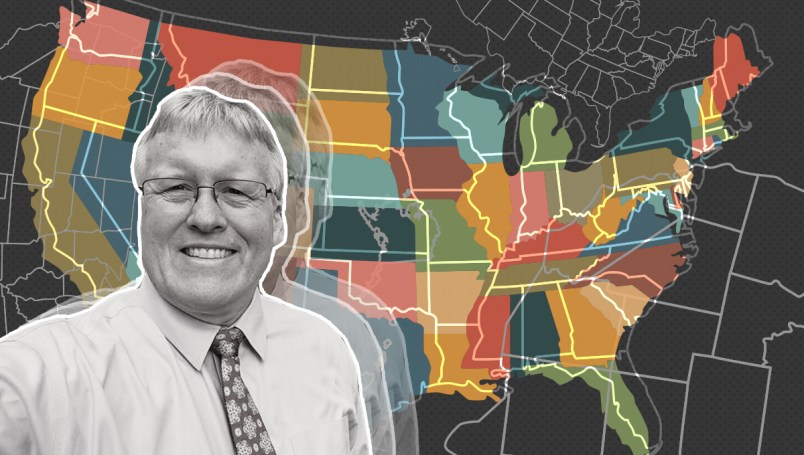John Pudner is a bit of an anomaly.
The deeply conservative GOP strategist has managed to retain allies on the left despite stints running Breitbart Sports, helping Tea Party icon David Brat win a U.S. House seat, and defending President Trump after the Mueller investigation.
Now Pudner wants to use his skill at connecting across party lines to make the Republican Party change its mind about gerrymandering.
His group, Take Back Our Republic, is the only openly conservative group that wants bipartisan, independent commissions to take charge of drawing congressional and legislative maps. This stance is completely at odds with other national GOP organizations working on redistricting — like the Republican State Legislative Committee and Scott Walker-involved National Republican Redistricting Trust — who think that legislators should have free rein to carve up districts as they see fit.
For now, Take Back is fighting a lonely battle and has little sway on the issue. Several redistricting experts and national organizations pushing for reform told TPM that they’ve never heard of the group at all. But anti-gerrymandering momentum is gaining force, elevated in the public eye by a spate of recent Supreme Court cases. Pudner thinks history is on their side.
“As with almost anything in life, it’s better if people who have vested interests aren’t making the decision,” Pudner told TPM of his support for the commission model, which he called “the gold standard.”
Redistricting wasn’t initially a priority for Take Back. Founded in 2015 to make the conservative case for getting big money out of politics, gerrymandering eventually emerged as a relevant tangential issue. Pudner observed that it’s much harder to win a low-budget grassroots campaign in a puzzle piece-shaped district that’s been carved up to lawmakers’ liking.
The group’s gerrymandering work primarily involves funding and campaigning for state ballot initiatives and bills that aim to undo the practice. Take Back supported a New Mexico constitutional amendment to bar unfair redistricting, traveled around Ohio to gin up support for a bipartisan gerrymandering reform bill passed by the legislature last year, and backed a successful, hard-fought effort to establish an independent commission in Michigan via ballot initiative.
Dan Vicuña, national redistricting director for voting rights group Common Cause, called Take Back “a really really great ally around the country.”
“Right-leaning groups [working on redistricting reform], unfortunately, are few and far between at the national level,” Vicuña added. “We do have supportive groups or individuals within states that are right-leaning, but in terms of the national landscape, unfortunately, it’s become a partisan issue.”
Mia Lewis, a campaigns coordinator with Common Cause Ohio, visited Cincinnati with Pudner last year to get out the word about Issue 1, the gerrymandering reform bill. She told TPM that his “really strong conservative credentials” helped open doors to possible allies on the legislation that may otherwise have remained closed.
“We went and we met with the Catholic archdiocese and we met with the Chamber of Commerce and those kinds of people who may have been more reluctant if we were coming from just one part of the political spectrum,” Lewis said.
Some political observers are more skeptical of Take Back Our Republic’s efficacy, questioning why they are currently pushing redistricting reform in the blue state of Massachusetts. The Bay State’s 2011 maps are less egregiously gerrymandered than those in many other U.S. states, and an effort to use a ballot initiative to create an independent commission could not be pushed through by the time the maps are redrawn in 2021.
Skeptics wonder if the Republican group is just trying to muddy the question of which party deserves the most blame for partisan gerrymandering.
“There is certainly a broader theme over the past several years of Republicans pushing for reform in states that went for Democrats,” said Carolyn Fiddler, an expert in state politics who works as political editor at the Daily Kos.
“I think this move in Mass. kind of indicates how amateur hour they are,” Fiddler added. “Their timing is just embarrassing.”
Pudner said he’s more focused on forcing lawmakers and voters to rethink how gerrymandering works in Massachusetts and elsewhere than he is in scoring immediate wins.
“There are partial successes you can have,” he told TPM. “[Lawmakers] start going home and are surprised to hear from their constituents this has become more of a voting issue.”
Within his own party, Pudner is certainly playing the long game.
The National Republican Redistricting Trust insists that the independent citizen commissions Pudner champions are “easily and often gamed by Democrats.”
The Republican State Legislative Committee, which oversaw the 2010 effort to sweep statehouses and then gerrymander maps in Republicans’ favor, recently told TPM that the commissions are “a charade,” dismissing Katie Fahey, who led the successful effort to institute one in Michigan, as a “Hillary Clinton volunteer.”
Take Back, meanwhile, spent $60,000 on its outreach for Fahey’s campaign, going out to the state to rally support for it.
For now, there is a huge discrepancy in funding and name recognition between Take Back and the GOP outfits that oppose it. But Pudner thinks that more conservatives will get on board with reform if they take a beating in the 2020 elections. They’ve already done so in states like Virginia, where Democrats may flip the statehouse this year.
“I do think that it’ll be interesting if the Democrats do get a bunch more legislatures how much more mainstream among conservatives our argument will be,” he said.
Ultimately, in Pudner’s view, “It’s about insiders versus outsiders. If we get a system that works, whoever wins at the ballot box, God bless them.”
Correction: This piece originally said Take Back Our Republic donated $60,000 to Fahey’s campaign. The organization actually spent that sum raising awareness for the initiative, according to Pudner.



